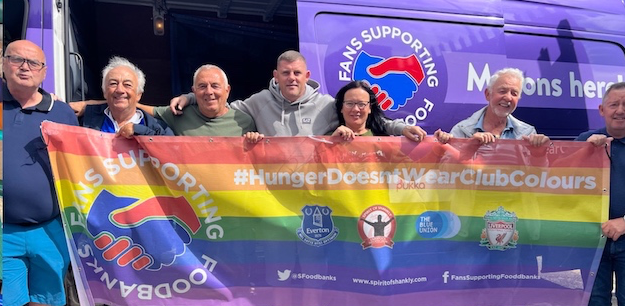Liverpool researchers analyse impact of football fan run food pantries
Researchers in Liverpool have analysed the work of a local charity that runs food pantries across the city.
The team from Liverpool John Moores University (LJMU) embedded themselves within the network operated by Fans Supporting Foodbanks (FSF), interviewing service users to learn about the impact of the facilities.
The four researchers observed and volunteered in the six FSF pantries, and one breakfast club in Birkenhead, between April 2021 and September 2023.
They then interviewed 176 service users about their experiences and feelings towards the service.

FSF grew out of concern about the deteriorating economic and social conditions of many people within Liverpool City Region. Volunteers began collecting food outside Everton and Liverpool matches in 2015.
They now supply 25 per cent of all food donations to north Liverpool foodbanks.
Collections have spread to 40 FSF groups across the UK and other sports like rugby league. Their aim is to eradicate food poverty.
In addition, they run six pantries and the Sunday breakfast club.
The researchers found:
- 67% of those using the six pantries are female.
- 78% of users are over the age of 40. (40-65: 40%, 65+ 38%).
- 62% of users have been using a pantry for over a year.
- Word of mouth (59%) is the primary means by which users discover the pantry.
- Use is driven by people collecting food for themselves (82%), children (43%) and a spouse (25%).
- 82% of users find security in using the pantry. This is, however, not a static feeling and the emotions developed over time.
- Emotions expressed by users revolve around embarrassment moving to joy(48%) and acceptance (43%) over time.
- 53% of users ranked the pantries as very important.
Users appear to use the pantry to supplement their weekly shopping and to assist with the financial burdens exacerbated by austerity and the cost of living crisis.
The impact statement from the researchers said: “More than supplying food/resources what the FSF movement in Liverpool shows is that by activating fans and empowering communities the risks and indignities of food poverty are held back, for now. The most valuable impact of the FSF pantries is not about food but another essential human need – belonging. For a few hours a week they allow people who are in need and/or isolated to connect with each other and their communities.”
The research team was led by Dr Jack Sugden who worked with Dr Matthew Hindmarsh, Dr Clay Gransden and Dr Chris Faulkner.
Read the full report here.




